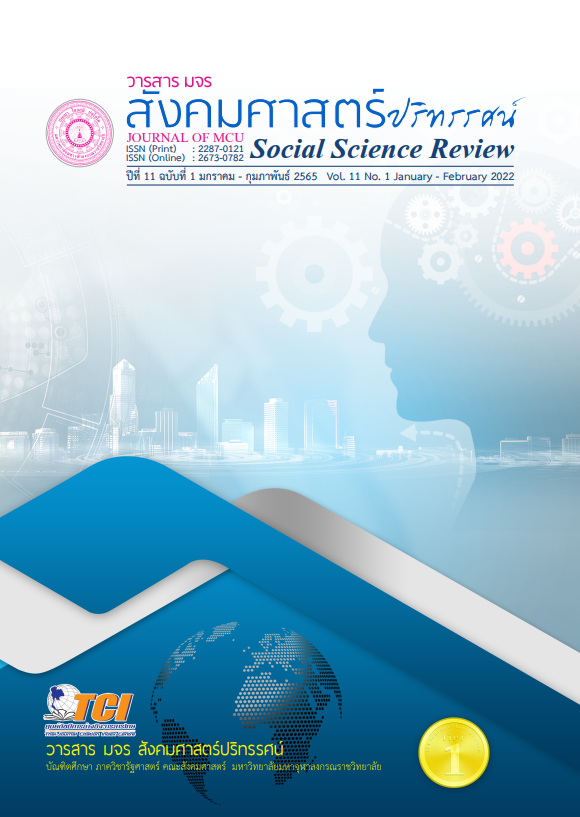การพัฒนานวัตกรรมการสื่อสารภาษาอังกฤษเพื่อการท่องเที่ยว เชิงนิเวศวัฒนธรรม สำหรับบุคลากรด้านการท่องเที่ยว เขตพัฒนาราษฎรบนพื้นที่สูง จังหวัดอุทัยธานี
คำสำคัญ:
การพัฒนานวัตกรรม, การสื่อสารภาษาอังกฤษ, การท่องเที่ยวเชิงนิเวศวัฒนธรรมบทคัดย่อ
บทความวิจัยนี้มีวัตถุประสงค์เพื่อศึกษาความต้องการใช้ภาษาอังกฤษ การสร้างและพัฒนานวัตกรรมการสื่อสารภาษาอังกฤษ และสอบถามความพึงพอใจ เก็บข้อมูลกับกลุ่มตัวอย่าง คือบุคลากรผู้เกี่ยวข้องด้านการท่องเที่ยว อำเภอบ้านไร่และอำเภอห้วยคต จังหวัดอุทัยธานี 59 คน โดยใช้ตารางสำเร็จรูปของเครจซี่และมอร์แกน และสุ่มเก็บตัวอย่างแบบเจาะจง เครื่องมือที่ใช้ คือ 1) แบบสำรวจ 2) แบบทดสอบ 3) แบบประเมิน 4) การสัมภาษณ์เชิงลึก 5) การสังเกต วิเคราะห์ข้อมูลด้วยสถิติเชิงพรรณนา ได้แก่ การแจกแจงความถี่ ค่าร้อยละ ค่าเฉลี่ย ค่าเบี่ยงเบนมาตรฐาน และใช้วิธีการวิเคราะห์เนื้อหา ข้อมูลเชิงคุณภาพเก็บรวบรวมข้อมูลด้วยการสัมภาษณ์เชิงลึกโดยใช้เทคนิคสามเส้า
ผลการวิจัยพบว่า 1. ความต้องการใช้ภาษาอังกฤษเพื่อการท่องเที่ยวฯ อยู่ในระดับมาก เพื่อพัฒนาทักษะการสื่อสารภาษาอังกฤษเพื่อการค้าขายของที่ระลึกพื้นเมืองและแนะนำสถานที่ท่องเที่ยวทางนิเวศวัฒนธรรมที่สำคัญ 2. การสร้างและพัฒนานวัตกรรมการสื่อสารภาษาอังกฤษ มีคู่มือการอบรมนวัตกรรมการสื่อสารภาษาอังกฤษจำนวน 6 บทและผลลัพธ์หลังการอบรมใช้นวัตกรรมมีนัยสำคัญทางสถิติที่ระดับ 0.05 และ 3. ระดับความพึงพอใจของนักท่องเที่ยวที่มีต่อบุคลากรผู้ใช้ภาษาอังกฤษเพื่อสื่อสารเกี่ยวข้องด้านการท่องเที่ยวเชิงนิเวศวัฒนธรรมเขตพัฒนาราษฎรบนพื้นที่สูง จังหวัดอุทัยธานีอยู่ในระดับปานกลาง
เอกสารอ้างอิง
ทวีศักดิ์ ชูมา. (2560). แนวทางการพัฒนาทักษะการพูดภาษาอังกฤษเพื่อการสื่อสารโดยใช้รูปแบบกลวิธีการสื่อสาร. วารสารมหาจุฬาวิชาการ, 3(1), 125-137.
ปวันรัตน์ นิกรกิตติโกศล. (2559). การพัฒนานวัตกรรมการสื่อสารภาษาอังกฤษ สำหรับผู้ประกอบการร้านขายของที่ระลึก ร้านอาหารและเครื่องดื่มที่เกาะเกร็ด จังหวัดนนทบุรี. วารสารสมาคมนักวิจัย, 21(2), 110-122.
ผาณิต บุญยะวรรธนะ. (2542). ความต้องการภาษาอังกฤษในธุรกิจการท่องเที่ยว (รายงานการวิจัย). เชียงใหม่ : ภาคภาษาอังกฤษ คณะมนุษยศาสตร์ มหาวิทยาลัยเชียงใหม่
พิชัย สดภิบาล. (2553). การสื่อสารระหว่างวัฒนธรรม : ปัจจัยเพื่อการพัฒนาและส่งเสริมการท่องเที่ยว. สืบค้น 19 ธันวาคม 2563, จาก http://www.thaiblogonline.com/sodpichai.blog?
ศูนย์ข้อมูลข่าวอาเซียน กรมประชาสัมพันธ์. (2561). ข่าวสารอาเซียน. สืบค้น 10 ธันวาคม 2563, จาก http://www.aseanthai.net/main.php?filename=inde
สำนักงานประชาสัมพันธ์จังหวัดอุทัยธานี. ศูนย์รวมข่าวประชาสัมพันธ์ (2561). สืบค้น 10 ธันวาคม 2563, จาก https://uthaithani.prd.go.th/th/page/ item/index/id/12
สำนักงานปลัดกระทรวงการท่องเที่ยวและกีฬา. (2563). รายงานฉบับสมบูรณ์โครงการค่าใช้จ่ายสำหรับสำรวจทัศนคติและความพึงพอใจของนักท่องเที่ยวชาวไทยและชาวต่างชาติที่เดินทางท่องเที่ยวในประเทศไทย. กรุงเทพฯ: กระทรวงการท่องเที่ยวและกีฬา.
เอื้อมพร หลินเจริญ. (2562). เทคนิคการวิเคราะห์ข้อมูลเชิงคุณภาพ. วารสารการวัดผลทางการศึกษา, 17(1), 17-29.
Bloom, B. S. et al. (1971). Handbook on Formative and Summative Evaluation of Student Learning. New York: Mc Graw-Hill Book Company.
Cajee, L. (2014). Eco-Cultural Tourism: A Tool for Environmental, Cultural and Economic Sustainability (A Case Study of Darap Village, West Sikkim). SHS Web of Conference, 12, 1-9.
Krejcie, R. V., & Morgan, D. W. (1970). Determining Sample Size for Research Activities. Educational and Psychological Measurement, 30(3), 607-610.
Naunton, J. (2005). Profile 2: Intermediate. Oxford: Oxford University Press.
Nomnian, S. (2014). Thai Entrepreneurs’ Needs of English Language for Raft Service Business. Silpakorn University Journal of Social Sciences, Humanities, and Arts, 14(3), 101-128.
Simasathiansophon, N., et al. (2020). Tourist’s decision to travel to Thai cultural tourism destination in central part of Thailand. E3S Web of Conferences, 164, 1-11.
Wallace, G. (2014). Eco-cultural tourism as a means for the sustainable development of culturally marginal and environmentally sensitive region. Tourist Studies, 4(3), 235–254.
ดาวน์โหลด
เผยแพร่แล้ว
รูปแบบการอ้างอิง
ฉบับ
ประเภทบทความ
สัญญาอนุญาต
ลิขสิทธิ์ (c) 2022 วารสาร มจร สังคมศาสตร์ปริทรรศน์

อนุญาตภายใต้เงื่อนไข Creative Commons Attribution-NonCommercial-NoDerivatives 4.0 International License.
เพื่อให้เป็นไปตามกฎหมายลิขสิทธิ์ ผู้นิพนธ์ทุกท่านต้องลงลายมือชื่อในแบบฟอร์มใบมอบลิขสิทธิ์บทความให้แก่วารสารฯ พร้อมกับบทความต้นฉบับที่ได้แก้ไขครั้งสุดท้าย นอกจากนี้ ผู้นิพนธ์ทุกท่านต้องยืนยันว่าบทความต้นฉบับที่ส่งมาตีพิมพ์นั้น ได้ส่งมาตีพิมพ์เฉพาะในวารสาร มจร สังคมศาสตร์ปริทรรศน์ เพียงแห่งเดียวเท่านั้น หากมีการใช้ภาพหรือตารางหรือเนื้อหาอื่นๆ ของผู้นิพนธ์อื่นที่ปรากฏในสิ่งตีพิมพ์อื่นมาแล้ว ผู้นิพนธ์ต้องขออนุญาตเจ้าของลิขสิทธิ์ก่อน พร้อมทั้งแสดงหนังสือที่ได้รับการยินยอมต่อบรรณาธิการ ก่อนที่บทความจะได้รับการตีพิมพ์ หากไม่เป็นไปตามข้อกำหนดเบื้องต้น ทางวารสารจะถอดบทความของท่านออกโดยไม่มีข้อยกเว้นใดๆ ทั้งสิ้น





